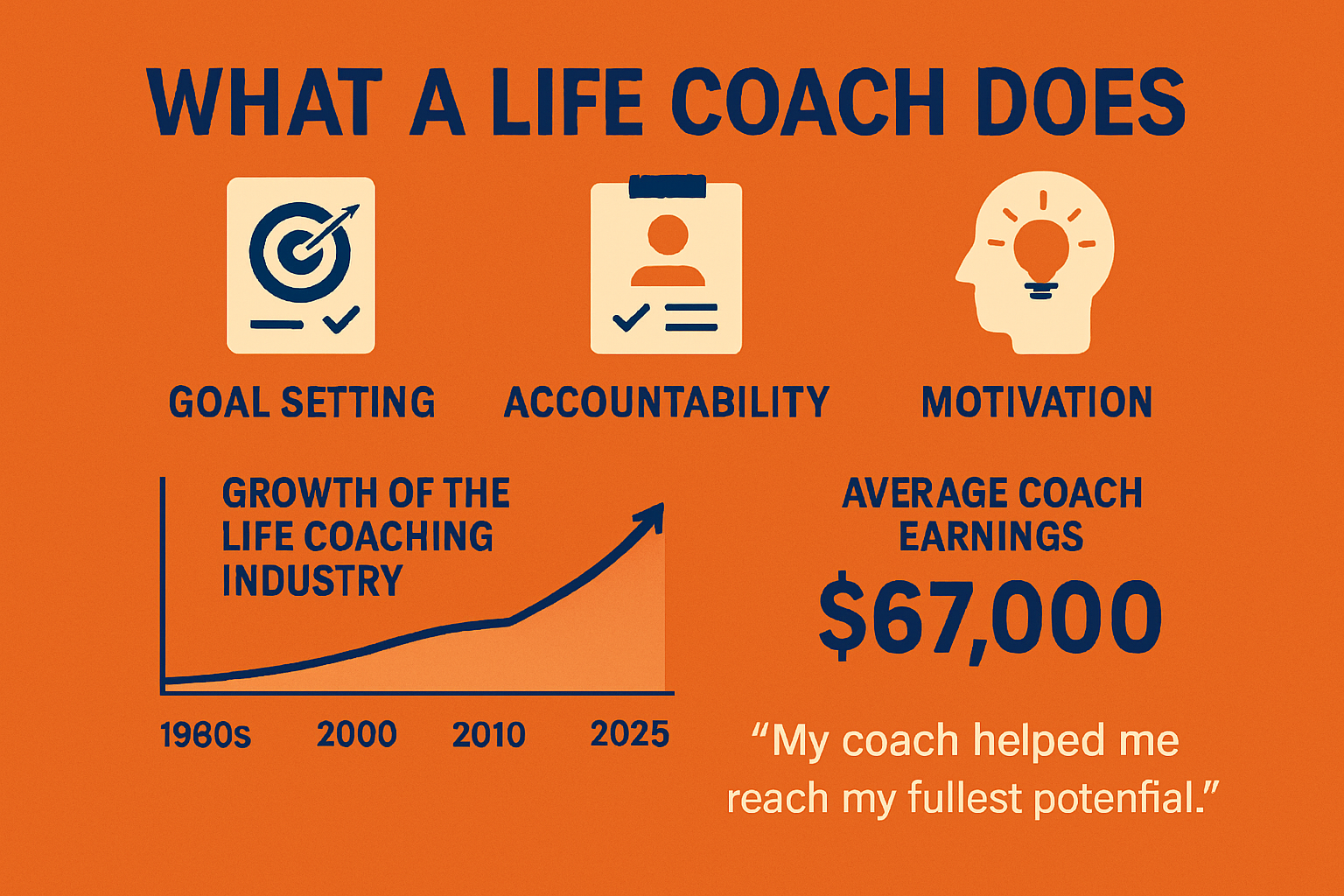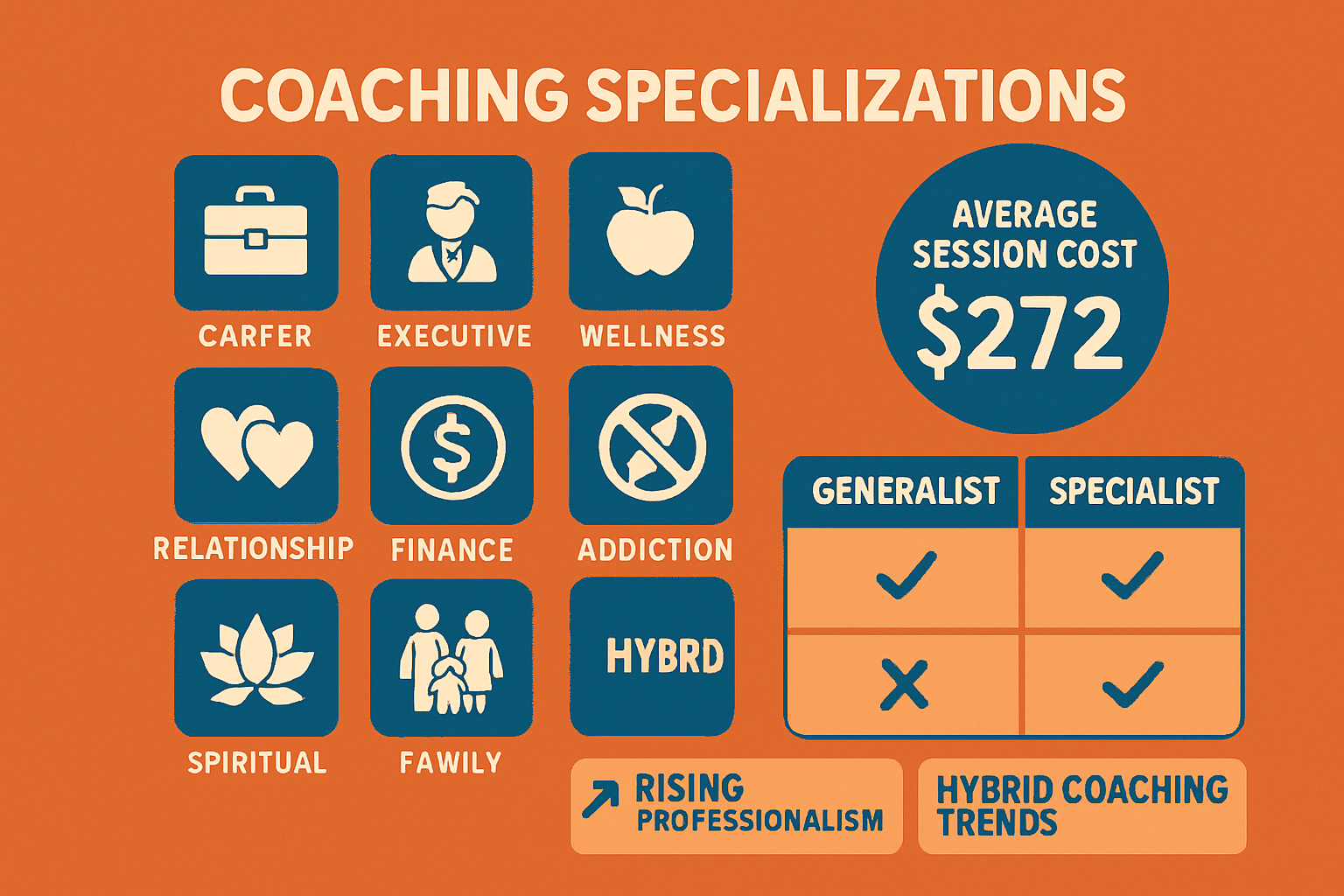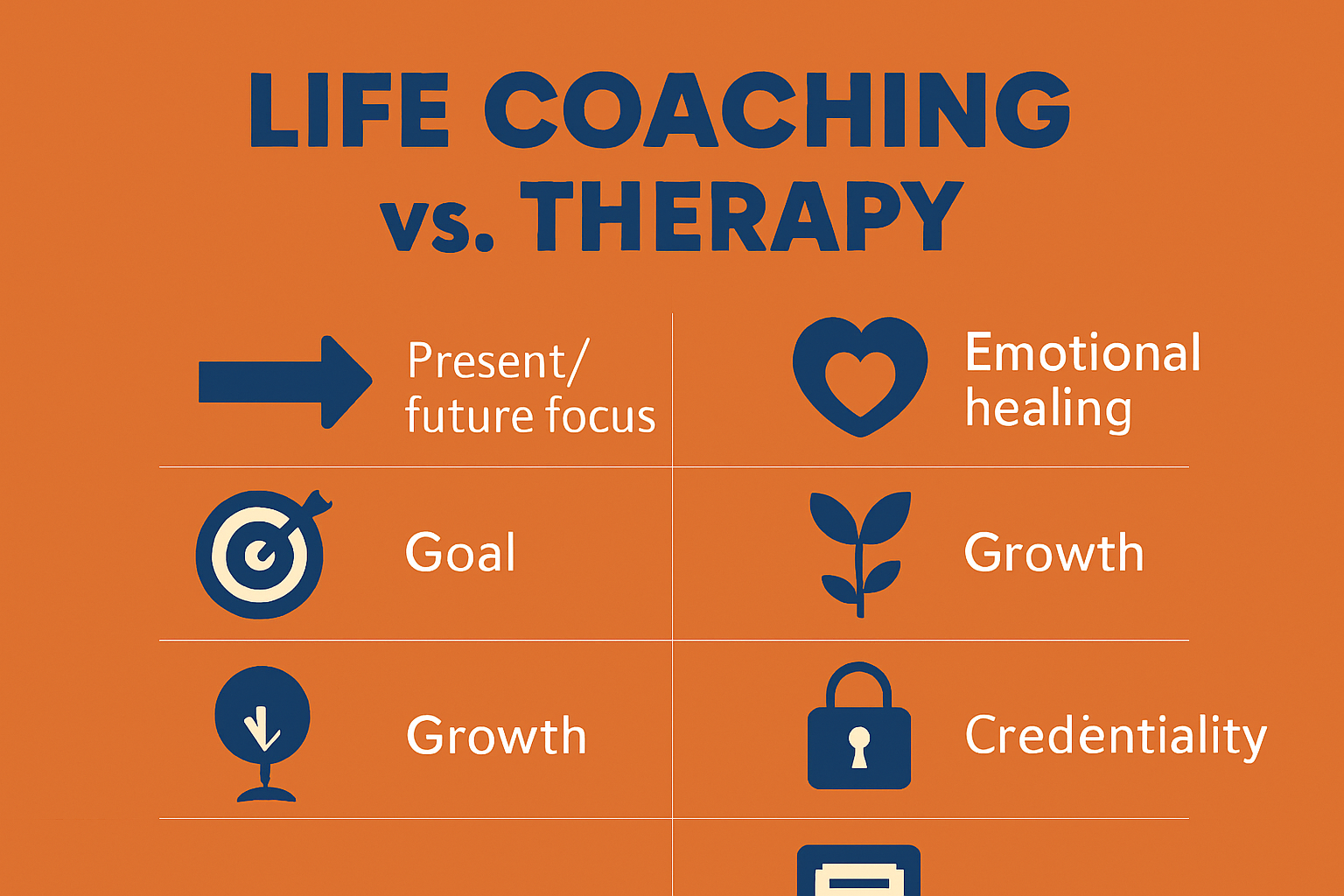Posted on August 22, 2025 by Don Markland
Imagine unlocking your full potential and achieving your biggest goals in 2025. What if the secret was simply having the right coach in life by your side? A coach in life acts as a proven catalyst, guiding you to break through barriers and reach new heights. In this guide, you’ll discover how to find, choose, and get the most from life coaching for real results. We’ll explore what coaches do, who benefits most, types of coaching, key differences from therapy, steps to start, and tips for lifelong success. Ready to make 2025 your breakthrough year? Let’s begin.What Is a Life Coach and Why Are They Vital for Success in 2025?
Have you ever wondered what sets high achievers apart in today’s fast-paced world? For many, the answer is a coach in life—a professional partner who empowers you to reach your highest potential. As we approach 2025, the demand for life coaching is skyrocketing. But what exactly does a coach in life do, and why are they becoming so essential for personal success? A coach in life is a trained professional who helps you clarify your most meaningful goals, overcome obstacles, and design actionable strategies for growth. Unlike therapists, who often focus on healing the past, a coach in life is future-oriented and solution-driven. This approach has gained remarkable popularity since the 1980s and 1990s, with life coaching moving from the fringes into the mainstream. Today, the industry is valued at over $2.85 billion, and coaches in North America earn an average of $67,800 annually (ICF 2023). While the field remains unregulated, many reputable coaches pursue credentials from organizations like the International Coaching Federation (ICF) to build trust and demonstrate expertise.
Why are so many people turning to a coach in life? The answer lies in their unique, action-oriented process. Coaches don’t just listen—they help you set clear goals, identify limiting beliefs, and break down big dreams into step-by-step plans. They offer accountability, so you stay on track even when motivation dips. Regular check-ins, encouragement, and unbiased feedback keep you moving forward. Unlike traditional therapy, coaching is typically time-limited and focused on tangible results. This makes a coach in life the perfect strategic partner for anyone seeking meaningful change quickly.
Real-world success stories highlight the impact of working with a coach in life. Imagine someone feeling stuck in an unfulfilling job. With the guidance of a coach, they clarify what truly matters, dismantle self-doubt, and map out a new career path. Research shows that coaching is linked to improved self-efficacy and faster goal achievement (Frontiers in Psychology, 2020). As the world grows more complex and competitive, having a coach in life isn’t just a luxury—it’s a smart investment in your ability to adapt, thrive, and create the future you want.
If you’re ready to take action, you can find a life coach near you who matches your goals and values. In 2025, the right coach in life could be your secret weapon for unlocking new levels of personal and professional success.
A coach in life is a trained professional who helps you clarify your most meaningful goals, overcome obstacles, and design actionable strategies for growth. Unlike therapists, who often focus on healing the past, a coach in life is future-oriented and solution-driven. This approach has gained remarkable popularity since the 1980s and 1990s, with life coaching moving from the fringes into the mainstream. Today, the industry is valued at over $2.85 billion, and coaches in North America earn an average of $67,800 annually (ICF 2023). While the field remains unregulated, many reputable coaches pursue credentials from organizations like the International Coaching Federation (ICF) to build trust and demonstrate expertise.
Why are so many people turning to a coach in life? The answer lies in their unique, action-oriented process. Coaches don’t just listen—they help you set clear goals, identify limiting beliefs, and break down big dreams into step-by-step plans. They offer accountability, so you stay on track even when motivation dips. Regular check-ins, encouragement, and unbiased feedback keep you moving forward. Unlike traditional therapy, coaching is typically time-limited and focused on tangible results. This makes a coach in life the perfect strategic partner for anyone seeking meaningful change quickly.
Real-world success stories highlight the impact of working with a coach in life. Imagine someone feeling stuck in an unfulfilling job. With the guidance of a coach, they clarify what truly matters, dismantle self-doubt, and map out a new career path. Research shows that coaching is linked to improved self-efficacy and faster goal achievement (Frontiers in Psychology, 2020). As the world grows more complex and competitive, having a coach in life isn’t just a luxury—it’s a smart investment in your ability to adapt, thrive, and create the future you want.
If you’re ready to take action, you can find a life coach near you who matches your goals and values. In 2025, the right coach in life could be your secret weapon for unlocking new levels of personal and professional success.
Who Can Benefit from a Life Coach? Signs You’re Ready for Change
Feeling stuck, unfulfilled, or unsure about your next steps in life? You’re not alone. Many people reach a point where they crave more meaning, direction, or satisfaction. A coach in life can be the bridge to help you cross from where you are to where you want to be. People seek a coach in life for a range of reasons. Some want support navigating career transitions, while others hope to improve relationships or cope with stress. Persistent dissatisfaction, frequent irritability, or a sense that your creativity is blocked are clear signals that coaching might be the right next step. Coaching isn’t reserved for a crisis. In fact, most clients are already functioning well but want to elevate their lives further. Studies show that clients who work with a coach in life report better work-life balance, greater creativity, and stronger relationships. For example, an entrepreneur struggling with procrastination achieved consistent progress and renewed confidence with the help of a coach.When to Consider a Life Coach vs. Other Support
It’s important to know the difference between life coaching and other forms of support. A coach in life focuses on helping you set goals, create action plans, and move forward. They work with you on present and future objectives rather than exploring past trauma or diagnosing mental health conditions. Therapists, on the other hand, are licensed professionals trained to help with mental health challenges, emotional distress, or unresolved trauma. If you’re experiencing anxiety, depression, or need to process past events, therapy may be more appropriate. Coaching is ideal for those who want to grow, make changes, or achieve something new. For instance, someone aiming for a career pivot would benefit from a coach in life, while someone struggling with clinical anxiety should seek therapy. According to recent research, 80% of coaching clients seek personal development, highlighting the proactive nature of coaching. Knowing when to choose a coach in life versus a therapist ensures you get the support that fits your unique needs.Real-Life Scenarios: Who Seeks Coaching?
A wide variety of people work with a coach in life. Professionals facing burnout or feeling stuck in their careers often turn to coaching for renewed purpose. Individuals seeking better work-life balance or clarity during major transitions—like divorce, relocation, or retirement—find guidance and strategy through coaching. Coaching is also popular among creatives and leaders who want to maximize their impact or overcome creative blocks. Some coaches specialize in working with parents returning to the workforce, while others focus on teens or specific communities. Consider these scenarios:- A teacher feeling unfulfilled in her current role gains confidence and maps out a new career path with a coach in life.
- A parent navigating a return to work after years at home finds renewed direction and balance through coaching sessions.
- A business owner facing a challenging plateau receives accountability and fresh perspective, leading to growth.
Types of Life Coaches and Specializations: Finding Your Perfect Match
Finding the right coach in life is like choosing the perfect guide for a journey—one who truly understands your unique needs and goals. Whether you’re seeking clarity, motivation, or a new direction, recognizing the different types of coaches can make the process smoother and more rewarding. A coach in life can be a generalist or a specialist. Generalist coaches help clients with a wide range of life challenges, from building confidence to improving work-life balance. They’re ideal if you want support across several areas or are unsure where to start.
Specialist coaches, on the other hand, focus on specific domains. If you have a clear goal—like advancing your career, improving relationships, or boosting wellness—a specialist can offer targeted strategies and deeper expertise. Choosing between a generalist or specialist often depends on your immediate priorities and the complexity of your aspirations.
Here’s a table summarizing common coach in life specializations and their primary focus:
A coach in life can be a generalist or a specialist. Generalist coaches help clients with a wide range of life challenges, from building confidence to improving work-life balance. They’re ideal if you want support across several areas or are unsure where to start.
Specialist coaches, on the other hand, focus on specific domains. If you have a clear goal—like advancing your career, improving relationships, or boosting wellness—a specialist can offer targeted strategies and deeper expertise. Choosing between a generalist or specialist often depends on your immediate priorities and the complexity of your aspirations.
Here’s a table summarizing common coach in life specializations and their primary focus:
| Coach Specialization | Focus Area |
|---|---|
| Career Coach | Job transitions, advancement |
| Executive Coach | Leadership, team management |
| Health/Wellness Coach | Fitness, nutrition, stress relief |
| Relationship Coach | Communication, conflict, dating |
| Financial Coach | Budgeting, debt, money mindset |
| Addiction/Recovery | Sobriety, relapse prevention |
| Spiritual Coach | Purpose, values, personal growth |
| Family/Parenting Coach | Parenting skills, family dynamics |
| Business Coach | Entrepreneurship, scaling startups |
Life Coach vs. Therapist: Key Differences and How to Decide
Navigating personal growth can feel overwhelming, especially when deciding between a coach in life or a therapist. Understanding their unique roles is essential for choosing the right path to your goals. A coach in life is a professional who partners with clients to clarify ambitions, break through obstacles, and develop action plans for progress. Their focus is on the present and future, helping you identify strengths, set meaningful goals, and stay accountable. In contrast, therapists are licensed clinicians who treat mental health conditions, trauma, and emotional distress, often exploring past experiences to heal deep-seated issues. Let’s break down the differences in a simple comparison table:| Aspect | Coach in Life | Therapist |
|---|---|---|
| Focus | Present/future goals, growth | Past trauma, mental health |
| Approach | Solution-focused, action-oriented | Insight-oriented, treatment-based |
| Credentials | Not regulated, optional certification | Licensed, regulated |
| Privacy Laws | Not required by law | Must follow HIPAA, strict privacy |
| Typical Client Needs | Goal-setting, accountability, development | Emotional healing, mental health |

Step-by-Step Guide: How to Work with a Life Coach for Maximum Results
Unlocking your potential with a coach in life is a journey of self-discovery, action, and growth. To get the most out of this transformative partnership, it’s essential to follow a clear, structured process. Here’s your step-by-step roadmap to ensure you maximize every session and achieve the results you want. Step 1: Clarify Your Goals and Readiness Every journey with a coach in life begins with self-reflection. Ask yourself: What do I want to change or achieve? Is it career growth, better work-life balance, or overcoming procrastination? Take time to journal or use self-assessment tools to identify areas for improvement. This clarity fuels motivation and helps your coach in life tailor their approach to your specific needs.- Reflect on recent challenges and wins.
- Write down your top three goals.
- Assess your readiness for change on a scale from 1–10.
- Does the coach’s style resonate with you?
- Are sessions offered virtually or in-person?
- What is the investment per session?
- Decide on session length and frequency.
- Set milestones and review points.
- Agree on reporting methods (journals, check-ins, progress trackers).
- Complete action items between sessions.
- Update your coach on progress and challenges.
- Celebrate small wins along the way.
- Schedule periodic reviews with your coach.
- Reflect on growth and areas for further development.
- Adjust your action plan for continued progress.
The Lasting Impact of Life Coaching: Benefits, Effectiveness, and Future Trends
Imagine if the right guidance could spark your most meaningful breakthroughs. The impact of working with a coach in life goes far beyond temporary motivation. It’s about lasting transformation—helping you not only reach your goals but sustain growth and fulfillment over time.The Proven Benefits of a Coach in Life
A coach in life supports you in turning aspirations into reality. Research reveals that people who engage with a life coach often report:- Improved work-life balance
- Stronger relationships
- Enhanced creativity
- Greater financial security
- Deeper personal fulfillment
| Benefit | Study/Source |
|---|---|
| Reduced procrastination | Frontiers in Psychology, 2020 |
| Improved self-efficacy | Frontiers in Psychology, 2020 |
| Enhanced creativity | Verywell Mind |
| Stronger relationships | Verywell Mind |
